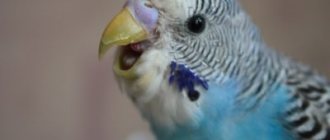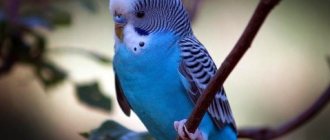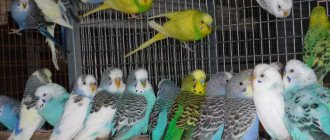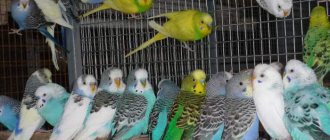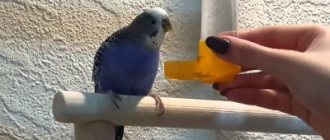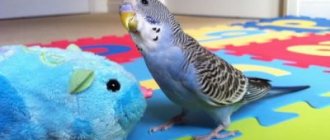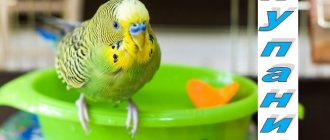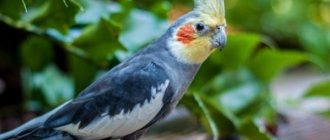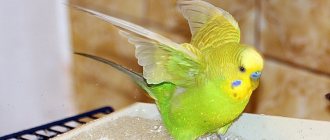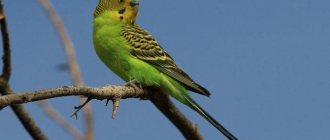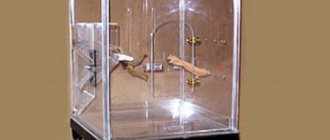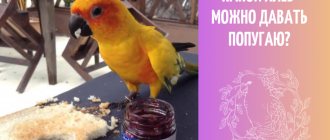This article, first of all, will be useful to those who are just thinking about purchasing a parrot. Our goal is not to dissuade you from purchasing, although that may seem exactly what you think. We will not embellish the “bird life” and our proximity to it.
The purpose of this article is to convey to the future owner that parrots are not such an easy type of pet as they seem and they also require a lot of care, expense and patience.
First, let's take a look, without embellishment, at what you will encounter if a parrot appears in your house.
Photo: Michael Verhoef
Pros of keeping parrots
Pets such as parrots have many advantages:
- Friendliness and sociability. Many people seek to have parrots in their home to alleviate loneliness. Parrots are social animals that need constant communication either with relatives or with humans. A bird can become a true friend to a lonely person or a full member of a large family. These birds love affection, strive to spend as much time as possible with the owner, love to sit on the shoulder or head and participate in the owner's household chores.
- Playfulness. These birds love to play with various objects, and watching the parrot's tricks gives people a lot of positive emotions.
- High intelligence and good learning ability. Many species learn to imitate human speech, as well as perform tricks.
- Cellular content. This is the main advantage of parrots. Since the bird sits in a cage most of the time, it does not destroy the apartment or damage the furniture.
- Long life expectancy. Small species live 10-15 years, and large ones live up to 100 years.
- No unpleasant odor. The bird itself has no smell; If you clean it regularly, there will also be no smell from the cage.
- Attractive appearance. Most species have bright colors, and some have unusually shaped plumage.
Gray Gray
Unlike its competitors, this species of birds cannot boast of bright plumage, but in terms of conversations, this comrade simply cannot be stopped. Grays can learn up to several dozen words and expressions
These birds can imitate sounds heard from the owner or any other sounds that may attract their attention in the house. Grays can even learn fragments from songs and then sing them
In addition, the Gray's intellect is so highly developed that the brain activity that bubbles up in this small head can be compared with that of an average five-year-old child
Like a child, this bird needs attention and a flock. If there are several Grays in the house, then the level of learning drops sharply, but if there is only one Gray in his pack, then he will try as hard as possible to speak your language with the family
Jaco, the record holders, could hold and operate 1,500 words in their heads, understanding the meaning of many of them. The sociality of birds is so developed that they adopt not only words, but also habits and even mood from their owner. A bird can, like you, be happy, sad and even irritable.
You should not hope that this bird will immediately become your best friend as soon as it appears in the house. Jacos are very emotional themselves, and moving and meeting new people can lead to long-term stress. A large amount of attention and treats can brighten up the picture a little and win over a harmful and touchy bird towards you.
Jaco, this is a bird that will initially always consider itself the master of the situation, but if it is covered with the proper amount of attention and care, then you will get along very quickly, and it is the person who will have the main word in the dialogue with this bird.
At the bird market you can find already adult and trained Grays. Yes, his vocabulary may be large, but such birds will be reluctant to relearn. If the bird is trained, then it once considered a person its friend and, missing it, may not accept a new family. It’s better to buy a young bird, which will be 3 times cheaper, and your family will learn to talk and make friends.
Disadvantages of keeping parrots
There are also disadvantages to keeping parrots at home:
- Noise. This is the main disadvantage of a parrot. Parrots are very sociable and active birds. During daylight hours, they constantly scream, rattle toys and bowls, climb noisily and fly around the cage. If the cage is not covered with a dark cloth at night, the bird will wake up at sunrise and begin to make noise. The screams of parrots, especially large species, are very loud and can disturb not only the owners, but also the neighbors in an apartment building.
- Dirt. This is also a big disadvantage of parrots. These birds are not known for their neatness, so there will always be feathers, leftover food and droppings scattered around the cage. During walks, the bird will also leave droppings and feathers everywhere. In many species, the skin produces a special powder that birds use to treat their plumage. In the room where the cage is, everything will be covered with a layer of this powder. Therefore, the room will have to be cleaned daily.
- Destructiveness. These birds have a powerful and sharp beak and great strength. During walks, they will chew furniture, tear curtains and wallpaper, and dig soil in flower pots. The cage must be strong, otherwise the bird will bend the bars or learn to open the door and get out of its own free will.
- Inability to leave your pet alone for a long time. Birds have a fast metabolism, so they cannot go long without food and water. You need to add food and change water daily or even twice a day. Therefore, if owners need to leave for a long time, they will have to look for someone who will take care of the animal.
- The need to pay a lot of attention to your pet. Parrots need to constantly communicate with their relatives or people. Without communication, they experience stress, begin to pluck their own feathers, refuse to feed, become lethargic, and attract attention with loud screams.
- Cellular content. Along with the advantages of cellular housing, there are also disadvantages. The cage takes up quite a lot of space, so it is necessary to allocate a separate space in the room where it will stand. The cage tray gets dirty quickly and needs daily cleaning. In addition, the entire cage and accessories should be washed regularly.
- Possible health problems for the owner. Some people develop allergies to bird waste or feed. Birds bought from a pet store or poultry market can cause psittacosis, salmonellosis, campylobacteriosis and chlamydia. Large parrots bite painfully and, if frightened, can cause serious injuries to humans with their beaks and claws.
Bird energy
The energy of birds deserves special attention. Birds have a restrained and extremely balanced aura, due to which quarrels occur much less often in families where parrots or pigeons are raised, and children grow up much calmer
For an artist or musician, a bird will be the most useful pet, because its aura stimulates the strengthening of creative potential. Any creative person living next door to a bird will work with double productivity.
Singing is the main “weapon” of birds in the fight against a person’s bad mood. Many experiments and observations prove that if a person often listens to the chirping of birds, then his mood becomes more optimistic, and the general tone of the body increases several times.
Radiation protection: physicists have figured out how to profitably dispose of cement dust
Where to buy housing: Russian cities with the most profitable real estate are named
Wrist lines talk about our future: what each of them means
In the Chinese teaching of Feng Shui, many flattering words are also written about birds. According to Eastern wisdom, feathered creatures living in the northern part of a house or apartment attract wealth to the home, ward off misfortunes, and also increase the self-esteem of household members.
Many experts in the field of esotericism believe that birds have beneficial energy that has a positive effect on human health. In particular, feathered creatures can cure heart disease and also minimize the risk of heart attack.
What is the best parrot to have at home?
When choosing a pet, people are often interested in what size and type of parrot they should have in their apartment. Small (lovebird, budgerigar) and medium-sized (corella) species are best suited for apartment keeping. They are easily tamed, non-aggressive, learn tricks and repeat human speech, and are not capable of severely destroying an apartment or causing serious injury to the owner. A cage with such a bird does not take up much space. A small parrot makes less noise and dirt than a large one. It is easier to care for, and food for it is cheaper.
Lovebird. Budgerigar. Corella.
On a note! Large species (cockatoos, macaws, grays) are more suitable for keeping in a country house. In this case, you can allocate a separate room for your pet or build a spacious enclosure; his screams will not disturb the neighbors.
Choosing the right cage
How to choose a cage that will become a cozy and suitable home for a pair of perky wavy boys? It is enough to be guided by a couple of simple principles - space and atmosphere. The good mood of the feathered comrades and their health depend on this.
Buying a spacious parrot house
The cage should be spacious even when the parrot is alone. It is difficult to get along with a cramped bird - constant activity of the wings and flights from perch to another are required. If there are two individuals, you will have to double the “living space for one”. They need to somehow fly without interfering with each other.
Tall or elongated? Research shows that parrots fly on horizontal planes. That is why birds will only feel comfortable in an oblong cage. A high roof won't make any sense.
The minimum dimensions of a house for two wavy houses are 50 in height, 50 in width and 100 in length. If the owner has the opportunity to place a larger cage in the house, it is worth giving preference to more elongated ones.
If a house is chosen according to the minimum size, you cannot try to fill it with a lot of toys, perches, feeders and other things. The owner must remember: parrots must be comfortable. From time to time they need to spread their wings and fly, and a huge number of things will interfere with them.
You should also avoid all kinds of superstructures, floors, branches, labyrinths. All this is difficult to clean, and regular cleaning and changing bedding is the key to success in breeding parrots
Pay attention to simple, straight cells
Equally important is the correct location of the house. You need to choose a room or place where sudden changes in temperature are excluded, lighting and air humidity are normal
Doors, window sills, balconies are the most inappropriate places for feathered friends. It will be quite difficult to maintain their good mood in such arrangements.
Positive aspects of purchasing a parrot
Among the positive aspects we highlight the following:
- The beauty of parrots . This is the simplest and most natural plus. Variations of their varieties, colors, brightness will not leave indifferent even not very big fans of these birds.
- Improving a person's psychological state . World-class scientists have proven that they are able to help people fight depression and easily lift their spirits. Lonely people are given the opportunity not to feel confused, forgotten, and are allowed to feel at one with nature. You can talk to them and even teach them how to pronounce certain phrases. This is a kind of antidepressant; there are even special techniques using parrots to improve mental balance.
- They treat the cardiovascular system.
- The ability to destroy negative energy . In this case, you need to trust the opinion of psychics who claim this property.
- Develop creative skills, if any.
- They bring a sea of joy . Parrots also have a positive effect on adults, but it should be noted that they bring particular benefits to homes where there are children. Thanks to these birds, children learn to explore the world, even those children who do not speak (at an early age) can teach their pet to speak and pronounce words, thus they themselves will learn to speak faster. Parrots are also taught to take care of someone else besides themselves, so this creates responsibility.
- There is practically no unpleasant odor from the parrot's cage.
- Sharp mind . It would seem that parrots understand little, but after living with him for some time, it will become clear that he not only listens, but also understands what you are talking about, sings along to the rhythm of your conversation, and speaks.
- Under conditions of good care they live a long time ( 10-15 years ). Which is also important, because it’s hard to lose a beloved pet.
- They are relatively inexpensive to maintain . All you need is special food for parrots, and throughout the day you will need one, maximum two teaspoons, water, sand. And if you want to add vitamins to your diet, you can give herbs and ground eggshells. Agree, everything mentioned above cannot be expensive.
Disadvantages of keeping a parrot
Among the disadvantages of the content are the following:
- The need for a large housing area . Unfortunately, parrots cannot be walked and simply need to fly around the house, so if your living space is twelve square meters, owning these birds is not an option.
- Frequent allergies among owners . Feathers, droppings, and even small particles of dust from flapping wings can cause allergic reactions. These include inflammation of the respiratory tract, rashes, and ordinary sneezing.
- Very vocal . Parrots are still birds, and their main form of communication is singing. It is not always pleasant, especially when it turns into a scream, because they demand that attention be paid to them. The salvation in such cases will be an ordinary thick fabric that can be used to cover the cage.
- A lot of trash . Although these birds are not whimsical in their choice of food, they love to scatter and rake it. In addition, they molt twice a year, during which time a lot of fluff forms around the cage. Also, parrots’ homes need to be cleaned frequently. In hot weather - every other day, in cold weather - two or even three times a week.
- Sabotage character . When releasing a bird from its cage, damage to furniture, wallpaper, flowers is possible, and even droppings can end up anywhere.
- Painful bites . Parrots bite very painfully until they are tamed; it takes a lot of patience to do this, but there is no other way.
Lovebirds as the first domestic birds
One of the smallest parrots that develop quietly and live in captivity. Their length reaches 10-17 cm, and their body weight is 40-60 g.
Most often you can find lovebirds with a basic green color.
You can recognize them by their appearance, thanks to their strong curved beak of red and yellow color. These birds have an active and curious character. They fly beautifully, move quickly and climb branches. Talking lovebirds are extremely rare to find. Therefore, it is generally accepted that they are poorly trained.
The peculiarity of lovebirds is that they are monogamous and choose one partner for life
.
If one dies, then the second one grieves and is sad for a very long time. But after some time it recovers. On average, lovebirds live 20 years. They are unpretentious in care, but they definitely need to be raised in families.
To be or not to have a parrot in your home?
You must decide the answer to this question for yourself. What is clear is that in no case should you bring a parrot into the house because of one banal word “I want”! Here you need to weigh the pros and cons and decide on your reasoned choice not for a few days, but for several years, and possibly decades!
Most people keep cats or dogs at home. Parrots, especially large ones, are still considered exotic, despite the fact that caring for them is much easier and they bring no less joy. Our family decided to get a large parrot, since we had heard a lot about their intellectual abilities and already had experience in keeping birds - budgerigars. Since then, for nine years now, our Eva, a noble parrot, or eclectus, has been pleasing us with her company.
As a pet, a parrot has many advantages.
Signs of complications
Once it has been possible to understand that the parrot is “pregnant”, it is worth paying attention to the behavior of the female in order to notice signs of complications in time. Parrots may have problems laying eggs, especially when the female does not get enough vitamins or varieties in her food, or her diet lacks calcium.
When a bird fails to lay an egg, it becomes lodged in the vulva and can put pressure on the female's internal organs, eventually leading to death. Signs of this complication include a swollen belly (a bird's belly will not swell unless there is a problem), difficulty breathing, or limping. Limping may be a sign of severe nerve damage due to a stuck egg. Sitting on the ground for long periods of time is also a sign of complications.
Parrots have no hair
Instead of fur like dogs or cats, parrots have “powder.” These are tiny horny particles of down feathers that resemble talc in properties and are needed to repel water if the bird gets wet. But certain species of parrots (Eclectus are one of them) do not produce any powder, but have sebaceous glands. Such birds are suitable even for those who are allergic to feathers.
In addition, parrots are not as odorous as other animals. A healthy, well-groomed bird smells like honey or sun-dried feathers.
Parrots can learn to talk
Parrots are great imitators. They can reproduce the hum of a washing machine, a telephone ringtone, or the sound of a doorbell. If you are patient and work with the bird, it will learn not only to pronounce individual words and phrases, but also to repeat sentences in the right sequence. Our parrot, for example, knows how to tell a fairy tale about the Ryaba Hen and laughs very contagiously.
The talkativeness of a parrot largely depends on its species. The first place is rightfully occupied by African gray parrots, followed by Amazons. Cockatiels and budgies can also learn to speak up to a hundred or more words.
In order for a parrot to learn to talk, it is better to keep it alone, without other birds, so that a lack of communication arises, which will encourage the bird to make contact. The secret of training is simple: you need to practice regularly, pronounce the words emotionally and do not forget to praise and encourage your pet with his favorite treats. Sometimes the best reward for a bird is to scratch the top of its head against the feathers.
They are distinguished by their intelligence and intelligence
The gray parrot, or African gray parrot, is rightfully considered the most capable. This species can even analyze and reason logically at a basic level. Parrot Alex (by the first letters Avian Learning EXperience), one of the representatives of this breed, was specially chosen for the experiment by Dr. Irene Pepperberg. The psychologist set out to prove that parrots are capable of not only imitating sounds, but also making conscious decisions.
Jaco could identify up to 50 different objects and describe their colors, shape and material. Alex had the ability to be aware of the concepts of "more", "less", "same", "different", "above" and "under". His vocabulary was about 150 words, but that was not even his main feature.
The parrot was able to understand what he was saying, could ask a question, make a request and ask again if he was not given what was promised, or even complain of fatigue.
Alex reached the intellectual level of a five-year-old child and the emotional level of a two-year-old, and, according to the researcher, this was not the limit. Alex died at the age of 31. The last words he said to the hostess: “Be good. See you tomorrow. I love you".
Popular belief for lonely people
There are a huge number of folk superstitions about birds, but one is the most popular. It concerns those people who have been looking for a long time, but cannot find their soul mate. According to this folk wisdom, a person who gets two birds at once (female and male) will soon meet long-awaited love. At the same time, the acquaintance promises to be so unexpected that you simply will not believe in the reality of what is happening.
It's not about color: Russians shared the main criteria for choosing bank cards
How Buckingham Palace responded to Meghan's accusations after breaking its silence
Scientists have found out which juice lowers blood pressure: the answer is simple - tomato
Parrots are social animals
Parrots, like people, love communication and try to avoid loneliness. If a bird is deprived of company, it may develop depression, which can lead to self-plucking syndrome. That is, stress forces the bird to pluck its feathers.
At the same time, parrots are able to occupy themselves, for example, with the help of mirrors and baby rattles, and do not require much attention. When you go to work or are busy with business, your feathered friend can be placed in a cage.
If you raise a parrot, it can be no less affectionate and loving than a dog or cat. There are many examples when birds miss their owners and cannot even imagine their existence without their family. And our parrot is no exception: Eva is always sad when we go on vacation and rejoices at our return.
Unusual ways
If you have no idea how to teach a parrot to sit on your hand, try an unconventional teaching method. To do this, it is enough to trim the flight feathers on the wings. The bird will not be able to fly and will be forced to sit on the palm. But after the feathers grow, there is no guarantee that the bird will be tamed.
There is another recommendation that allows you to train a parrot in just a few days. Place both palms into the cage at once and keep them there. When the pet gets tired of fluttering, he will climb into your arms. On the fourth day of such experiments, the bird gets used to its new owner. But this method is not suitable for everyone, as it puts a strong strain on the psyche. The parrot will sit on your hands, but will still be afraid.
When taming a pet, do not wave your hands over its head. This is due to the fact that they have a reflex that a flicker from above is the shadow of a bird of prey. As a result, an association will arise: hand – danger. It will be impossible to retrain the bird.
Training is a rather lengthy process. Some wavy animals become tamed only at one year of age. You cannot punish a bird if it bites. This is an adequate reaction to an invasion of personal space. Or the pet is defending itself. In such a situation, try to calm the parrot in an even voice or move away from him. After some time, the procedure can be repeated.
You should not lure the bird with treats when it is just starting to leave its cage. In addition, you should not grab it suddenly. The purpose of taming is to make the pet not afraid of your palms. If you do everything right, you can quickly win the love and trust of your feathered friend.
Some of the most amazing pets are parrots. At first glance, it may seem that this is a primitive noisy bird. But that's not true. Or rather, this is true if the parrot is not tamed and trained. Of course, a wild parrot is nothing but trouble - as soon as the owner approaches the cage, the bird begins to scream and rush around, blowing its feathers all over the apartment. But a trained tame bird gives only positive emotions.
Easy to maintain
You need to clean up feathers and droppings after your parrot. Daily cleaning of the cage is much easier than endless cleaning of the litter box and hour-long walks outside. To keep your parrot healthy, it is enough to bathe it once a week and trim its claws in a timely manner. The birds take care of the cleanliness of their feathers themselves, regularly tidying themselves up.
Providing a balanced diet is also not difficult. In addition to high-quality store-bought food, the bird’s diet should include fresh fruits and vegetables (except avocados). Some parrots, especially large ones, benefit from sprouted grains: wheat, buckwheat, oats, mung bean.
For our family, feeding the parrot became an incentive to start sprouting: sprouts are also good for humans because they contain minerals, vitamins and enzymes.
Diet
Budgerigars have a varied diet. A balanced complex of nutrients and active substances will help you be completely healthy. Birds should be fed with special food from a pet store, but first the owner can consult with an ornithologist to choose a suitable grain mixture.
In addition to grain, birds should be given vitamins, which they can get from vegetables, fruits, cereals, herbs and nuts. Also, the bird’s body must receive macro and microelements, which should be given separately from complementary foods.
Prohibited Products
Everything that the owner eats will not suit the budgerigar’s diet. You should absolutely not give them caffeine, alcohol or cocoa. This is deadly for the life of the pet. You should also not give baked goods, because the yeast will swell inside the stomach and cause gastrointestinal upset. In addition to these foods, pets should not eat fried, sweet or spicy foods. You can replace all this with a boiled chicken egg, just cook without adding salt.
If the owner decides to pamper the pet with berries or fruits containing a seed, then it must be removed, because... under the influence of moisture, hydrocyanic acid is formed, the consumption of which will also cause food poisoning.
Favorite Products
Budgerigars are not picky eaters, so you can give them what you like. Fruits and vegetables containing vitamins A and B, as well as boiled nuts and cereals. Budgerigars love to crunch, so the owner can safely eat an apple, carrots, cabbage and crackers made from whole grain bran without salt.
